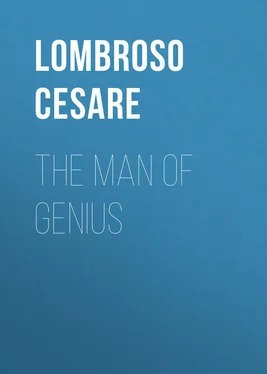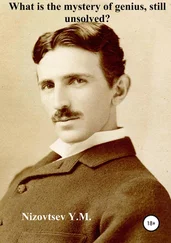Cesare Lombroso - The Man of Genius
Здесь есть возможность читать онлайн «Cesare Lombroso - The Man of Genius» — ознакомительный отрывок электронной книги совершенно бесплатно, а после прочтения отрывка купить полную версию. В некоторых случаях можно слушать аудио, скачать через торрент в формате fb2 и присутствует краткое содержание. Жанр: foreign_antique, foreign_prose, на английском языке. Описание произведения, (предисловие) а так же отзывы посетителей доступны на портале библиотеки ЛибКат.
- Название:The Man of Genius
- Автор:
- Жанр:
- Год:неизвестен
- ISBN:нет данных
- Рейтинг книги:5 / 5. Голосов: 1
-
Избранное:Добавить в избранное
- Отзывы:
-
Ваша оценка:
- 100
- 1
- 2
- 3
- 4
- 5
The Man of Genius: краткое содержание, описание и аннотация
Предлагаем к чтению аннотацию, описание, краткое содержание или предисловие (зависит от того, что написал сам автор книги «The Man of Genius»). Если вы не нашли необходимую информацию о книге — напишите в комментариях, мы постараемся отыскать её.
The Man of Genius — читать онлайн ознакомительный отрывок
Ниже представлен текст книги, разбитый по страницам. Система сохранения места последней прочитанной страницы, позволяет с удобством читать онлайн бесплатно книгу «The Man of Genius», без необходимости каждый раз заново искать на чём Вы остановились. Поставьте закладку, и сможете в любой момент перейти на страницу, на которой закончили чтение.
Интервал:
Закладка:
In the same way we can explain why it is that great minds do not seize ideas that the most vulgar intelligence can grasp, while at the same time they discover ideas which would have seemed absurd to others: their greater sensibility is associated with a greater originality of conception. In exalted meditation thought deserts the more simple and easy paths which no longer suit its robust energy. Thus Monge resolved the most difficult problems of a differential calculus, and was embarrassed in seeking an algebraic root of the second degree which a schoolboy might have found. One of Lulli’s friends used to say habitually on his behalf: “Pay no attention to him; he has no common sense: he is all genius.”
Paræsthesia. – To the exhaustion and excessive concentration of sensibility must be attributed all those strange acts showing apparent or intermittent anæsthesia, and analgesia, which are to be found among men of genius as well as among the insane. Socrates presented a photo-paræsthesia which enabled him to gaze at the sun for a considerable time without experiencing any discomfort. The Goncourts, Flaubert, Darwin had a kind of musical daltonism.
Amnesia. – Forgetfulness is another of the characters of genius. It is said that Newton once rammed his niece’s finger into his pipe; when he left his room to seek for anything he usually returned without bringing it. 79 79 Brewster, Life , 1856.
Rouelle generally explained his ideas at great length, and when he had finished, he added: “But this is one of my arcana which I tell to no one.” Sometimes one of his pupils rose and repeated in his ear what he had just said aloud; then Rouelle believed that the pupil had discovered the arcanum by his own sagacity, and begged him not to divulge what he had himself just told to two hundred persons. One day, when performing an experiment during a lecture, he said to his hearers: “You see, gentlemen, this cauldron over the flame? Well, if I were to leave off stirring it an explosion would at once occur which would make us all jump.” While saying these words, he did not fail to forget to stir, and the prediction was accomplished; the explosion took place with a fearful noise: the laboratory windows were all smashed, and the audience fled to the garden. 80 80 Revue Scientifique , 1888.
Sir Everard Home relates that he once suddenly lost his memory for half an hour, and was unable to recognise the house and the street in which he lived; he could not recall the name of the street, and seemed to hear it for the first time. It is told of Ampère that when travelling on horseback in the country he became absorbed in a problem; then, dismounting, began to lead his horse, and finally lost it; but he did not discover his misadventure until, on arrival, it attracted the attention of his friends. Babinet hired a country house, and after making the payments returned to town; then he found that he had entirely forgotten both the name of the place and from what station he had started. 81 81 Michiels, Le Monde du Comique , 1886.
One day Buffon, lost in thought, ascended a tower and slid down by the ropes, unconscious of what he was doing, like a somnambulist. Mozart, in carving meat, so often cut his fingers, accustomed only to the piano, that he had to give up this duty to other persons. Of Bishop Münster, it is said that, seeing at the door of his own ante-chamber the announcement: “The master of the house is out,” he remained there awaiting his own return. 82 82 Réveillé-Parise, op. cit.
Of Toucherel, it is told by Arago, that he once even forgot his own name. Beethoven, on returning from an excursion in the forest, often left his coat on the grass, and often went out hatless. Once, at Neustadt, he was arrested in this condition, and taken to prison as a vagabond; here he might have remained, as no one would believe that he was Beethoven, if Herzog, the conductor of the orchestra, had not arrived to deliver him. Gioia, in the excitement of composition, wrote a chapter on the table of his bureau instead of on paper. The Abbé Beccaria, absorbed in his experiments, said during mass: “ Ite! experientia facta est .” Saint Dominic, in the midst of a princely repast, suddenly struck the table and exclaimed: “ Conclusum est contra Manicheos .” It is told of Ampère that having written a formula, with which he was pre-occupied, on the back of a cab, he started in pursuit as soon as the cab went off. 83 83 Perez, L’enfant de trois à sept ans , 1886.
Diderot hired vehicles which he then left at the door and forgot, thus needlessly paying coachmen for whole days. He often forgot the hour, the day, the month, and even the person to whom he was speaking; he would then speak long monologues like a somnambulist. 84 84 Scherer, Diderot , 1880.
Rossini, conducting the orchestra at the rehearsal of his Barbiere , which was a fiasco, did not perceive that the public and even the performers had left him alone in the theatre until he reached the end of an act.
Originality . – Hagen notes that originality is the quality that distinguishes genius from talent. 85 85 Ueber die Verwandtschaft des Genies mit dem Irrsinn , 1887.
And Jürgen-Meyer: “The imagination of talent reproduces the stated fact; the inspiration of genius makes it anew. The first disengages or repeats; the second invents or creates. Talent aims at a point which appears difficult to reach; genius aims at a point which no one perceives. The novelty, it must be understood, resides not in the elements, but in their shock.” Novelty and grandeur are the two chief characters which Bettinelli attributes to genius; “for this reason,” he says, “poets call themselves troubadours or trouvères .” Cardan conceived the idea of the education of deaf mutes before Harriot; he caught a glimpse of the application of algebra to geometry and geometric constructions before Descartes. 86 86 Bertolotti, Il Testamento di Cardano , 1883.
Giordano Bruno divined the modern theories of cosmology and of the origin of ideas. Cola di Rienzi conceived Italian unity, with Rome as capital, four hundred years before Cavour and Mazzini. Stoppani admits that the geological theory of Dante, with regard to the formation of seas, is at all points in accordance with the accepted ideas of to-day.
Genius divines facts before completely knowing them; thus Goethe described Italy very well before knowing it; and Schiller, the land and people of Switzerland without having been there. And it is on account of those divinations which all precede common observation, and because genius, occupied with lofty researches, does not possess the habits of the many, and because, like the lunatic and unlike the man of talent, he is often disordered, the man of genius is scorned and misunderstood. Ordinary persons do not perceive the steps which have led the man of genius to his creation, but they see the difference between his conclusions and those of others, and the strangeness of his conduct. Rossini’s Barbiere , and Beethoven’s Fidelio were received with hisses; Boito’s Mefistofele and Wagner’s Lohengrin have been hissed at Milan. How many academicians have smiled compassionately at Marzolo, who has discovered a new philosophic world! Bolyai, for his invention of the fourth dimension in anti-Euclidian geometry, has been called the geometrician of the insane, and compared to a miller who wishes to make flour of sand. Every one knows the treatment accorded to Fulton and Columbus and Papin, and, in our own days, to Piatti and Praga and Abel, and to Schliemann, who found Ilium, where no one else had dreamed of looking for it, while learned academicians laughed. “There never was a liberal idea,” wrote Flaubert, “which has not been unpopular; never an act of justice which has not caused scandal; never a great man who has not been pelted with potatoes or struck by knives. The history of human intellect is the history of human stupidity, as M. de Voltaire said.” 87 87 G. Flaubert, Lettres à Georges Sand , Paris, 1885.
Интервал:
Закладка:
Похожие книги на «The Man of Genius»
Представляем Вашему вниманию похожие книги на «The Man of Genius» списком для выбора. Мы отобрали схожую по названию и смыслу литературу в надежде предоставить читателям больше вариантов отыскать новые, интересные, ещё непрочитанные произведения.
Обсуждение, отзывы о книге «The Man of Genius» и просто собственные мнения читателей. Оставьте ваши комментарии, напишите, что Вы думаете о произведении, его смысле или главных героях. Укажите что конкретно понравилось, а что нет, и почему Вы так считаете.












